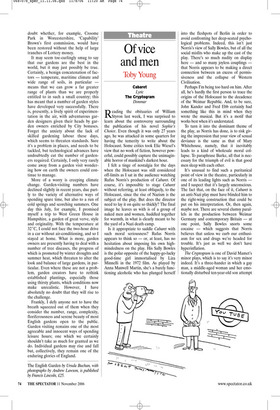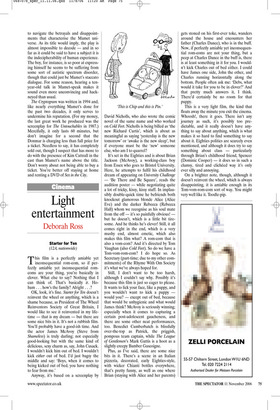Of vice and men
Toby Young
Cabaret Lyric The Cryptogram Donmar
Reading the obituaries of William Styron last week, I was surprised to learn about the controversy surrounding the publication of his novel Sophie’s Choice. Even though it was only 27 years ago, he was attacked in some quarters for having the temerity to write about the Holocaust. Some critics took Elie Wiesel’s view that no work of fiction, however powerful, could possibly capture the unimaginable horror of mankind’s darkest hour.
I felt a tinge of nostalgia for the days when the Holocaust was still considered off-limits as I sat in the audience watching Rufus Norris’s production of Cabaret. Of course, it’s impossible to stage Cabaret without referring, at least obliquely, to the Holocaust, since the rise of Nazism is the subject of the play. But does the director need to lay it on quite so thickly? The final image he leaves us with is of a group of naked men and women, huddled together for warmth, in what is clearly meant to be the yard of a Nazi death camp.
Is it appropriate to saddle Cabaret with such moral seriousness? Rufus Norris appears to think so — or, at least, has no hesitation about imposing his own highmindedness on the play. His Sally Bowles is the polar opposite of the happy-go-lucky good-time girl immortalised by Liza Minnelli in the 1972 film. As played by Anna Maxwell Martin, she’s a barely functioning alcoholic who has plunged herself into the fleshpots of Berlin in order to avoid confronting her deep-seated psychological problems. Indeed, this isn’t just Norris’s view of Sally Bowles, but of all the social misfits who make up the cast of the play. There’s so much nudity on display here — and so many joyless couplings that Norris appears to be making a direct connection between an excess of permissiveness and the collapse of Western Civilisation.
Perhaps I’m being too hard on him. After all, he’s hardly the first person to trace the origins of the Holocaust to the decadence of the Weimar Republic. And, to be sure, John Kander and Fred Ebb certainly had something like this in mind when they wrote the musical. But it’s a motif that works best when it’s understated.
To turn it into the dominant theme of the play, as Norris has done, is to risk giving the impression that your view of sexual deviance is the same as that of Mary Whitehouse, namely, that it inevitably leads to a kind of wholesale moral collapse. To paraphrase Burke, all that is necessary for the triumph of evil is that good men sleep with each other.
It’s unusual to find such a puritanical point of view in the theatre, particularly in one of its leading lights such as Norris and I suspect that it’s largely unconscious. The fact that, on the face of it, Cabaret is an anti-Nazi play must have blinded him to the right-wing construction that could be put on his interpretation. Or, then again, maybe not. There are several clumsy parallels in the production between Weimar Germany and contemporary Britain — at one point, Sally Bowles snorts some cocaine — which suggests that Norris believes that unless we curb our enthusiasm for sex and drugs we’re headed for trouble. It’s just as well we don’t have hyperinflation.
The Cryptogram is one of David Mamet’s minor plays, which is to say it’s very minor indeed. It’s a three-hander in which a gay man, a middle-aged woman and her emotionally disturbed ten-year-old son attempt to navigate the betrayals and disappointments that characterise the Mamet universe. As its title would imply, the play is almost impossible to decode — and in so far as it could be said to have a subject it is the indecipherability of human experience. The boy, for instance, is so poor at expressing himself he seems to be suffering from some sort of autistic spectrum disorder, though that could just be Mamet’s staccato dialogue. For some reason, hearing a tenyear-old talk in Mamet-speak makes it sound even more unconvincing and hackneyed than usual.
The Cryptogram was written in 1994 and, like nearly everything Mamet’s done for the past two decades, it only serves to undermine his reputation. (For my money, the last great work he produced was the screenplay for The Untouchables in 1987.) Mercifully, it only lasts 60 minutes, but don’t imagine for a second that the Donmar is charging less than full price for a ticket. Needless to say, it has completely sold out, though I suspect that has more to do with the presence of Kim Cattrall in the cast than Mamet’s name above the title. Don’t worry about not being able to buy a ticket. You’re better off staying at home and renting a DVD of Sex in the City.



































































































 Previous page
Previous page